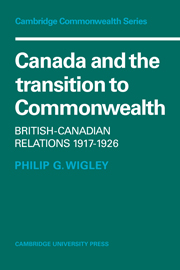Book contents
- Frontmatter
- Contents
- Abbreviations
- Preface
- Introduction
- 1 The threshold of responsibility, 1900–1916
- 2 New departures, 1917–1918
- 3 The settlement of peace, 1919
- 4 Unity and equality, 1919–1921
- 5 The centre cannot hold
- 6 Canadian diplomacy and Imperial diplomacy: 1923
- 7 From Lausanne to Locarno
- 8 The 1926 Imperial Conference: equality defined
- Conclusion
- Bibliography
- Index
1 - The threshold of responsibility, 1900–1916
Published online by Cambridge University Press: 26 March 2010
- Frontmatter
- Contents
- Abbreviations
- Preface
- Introduction
- 1 The threshold of responsibility, 1900–1916
- 2 New departures, 1917–1918
- 3 The settlement of peace, 1919
- 4 Unity and equality, 1919–1921
- 5 The centre cannot hold
- 6 Canadian diplomacy and Imperial diplomacy: 1923
- 7 From Lausanne to Locarno
- 8 The 1926 Imperial Conference: equality defined
- Conclusion
- Bibliography
- Index
Summary
In studying the course of British–dominion relations from 1917 it will be helpful as a preliminary exercise to look back for a moment before this period, to take note of some of the events and circumstances giving rise to the decade of developments which is our immediate concern. The most direct link in the causal chain is of course the pressures, the frustrations, the changes generated by two-and-a-half years of war. But we should go back briefly beyond the war's beginning, for even in the pre-war period Canada and the other dominions were starting to experience their coming of age: their first awareness of possible responsibilities, as dominions, to Britain and the imperial connection. This process owed little at first to any nascent feelings of national maturity within the overseas colonial communities. It was touched off, rather, by a palpable shift in the international – and by extension the imperial – balance of power, as a result of which Great Britain's place in the world rather suddenly became less secure. The Boer War and its aftermath provided an initial indication of the new order of things. Here for the first time Britain's splendid imperial isolation seemed to be a posture of weakness as much as strength. On the imperial side, it was true, there were still definite grounds for satisfaction. Prompt assistance from India had counted with telling effect for the British effort, manifesting India's role as the keystone of an imperial arch that as yet convincingly spanned Britain's territorial possessions.
- Type
- Chapter
- Information
- Canada and the Transition to CommonwealthBritish-Canadian Relations 1917–1926, pp. 6 - 26Publisher: Cambridge University PressPrint publication year: 1977



